Understanding RBT Salary
To gain a comprehensive understanding of Registered Behavior Technician (RBT) salaries, it’s important to explore the role of RBTs and the factors that can influence their salary.
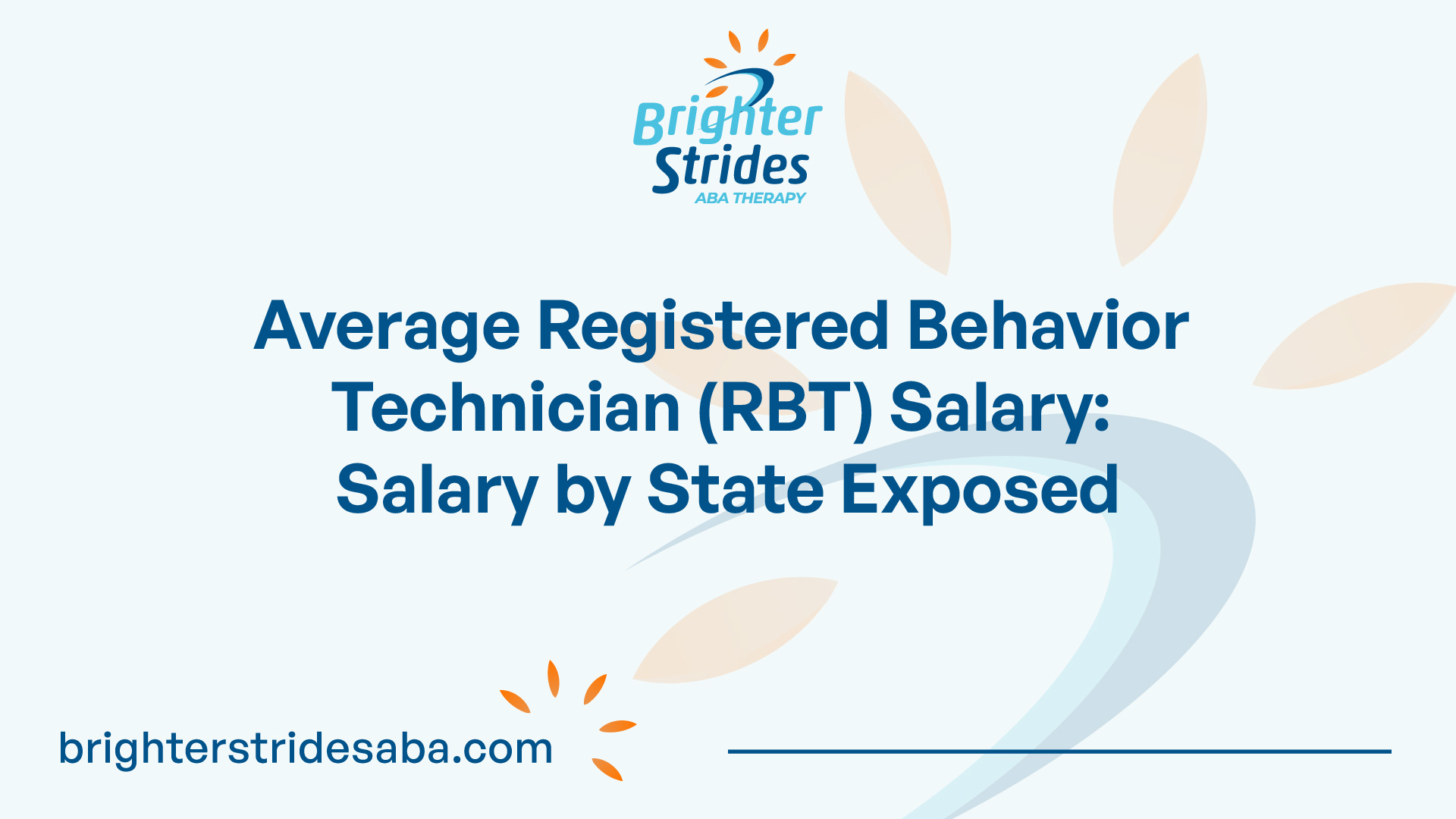
Introduction to Registered Behavior Technicians (RBTs)
Registered Behavior Technicians (RBTs) play a vital role in the field of Applied Behavior Analysis (ABA). They work under the supervision of Board Certified Behavior Analysts (BCBAs) to implement behavior intervention plans and provide support to individuals with developmental disabilities or behavioral challenges.
RBTs are responsible for implementing strategies designed by BCBAs, collecting data on behavior progress, and assisting with behavioral assessments. They often work directly with clients in various settings, such as homes, schools, or clinics, to facilitate behavior change and skill acquisition.
Factors Affecting RBT Salary
Several factors can influence the salary of an RBT. These factors vary depending on location, experience, and demand within the field. Understanding these factors can provide insight into the range of salaries RBTs can expect.
- Location: The geographical location where an RBT practices can significantly impact their salary. Different states have varying costs of living, demand for ABA services, and regulatory requirements, which can affect compensation levels.
- Experience: Like in many professions, experience plays a role in determining an RBT’s salary. As RBTs gain more years of experience and expertise in the field, they may command higher salaries.
- Demand: The demand for ABA services can influence the salary of an RBT. Areas with a higher demand for ABA services may offer higher salaries to attract and retain qualified RBTs.
- Education and Training: Additional education and training beyond the RBT certification can also impact salary. Pursuing further certifications, such as becoming a Board Certified Assistant Behavior Analyst (BCaBA) or a BCBA, may open doors to higher-paying positions within the field.
- Work Setting: The work setting can also affect an RBT’s salary. RBTs employed in private clinics or specialized facilities may receive higher salaries compared to those working in educational or community settings.
By taking these factors into account, individuals considering a career as an RBT can better understand the salary landscape and make informed decisions about their professional path. It’s important to note that salaries can vary significantly from state to state, so exploring the RBT salary by state will provide a more detailed overview of compensation levels across different regions.
RBT Salary by State
When it comes to the Salary of Registered Behavior Technicians (RBTs), it’s important to consider the variations that exist from state to state. Different factors such as cost of living, demand for RBTs, and state regulations can influence the salary ranges. In this section, we will explore the highest paying states for RBTs, the lowest paying states for RBTs, and the average RBT salary by state.
Highest Paying States for RBTs
Certain states offer higher salaries for RBTs compared to others. These states typically have a higher demand for RBTs and a higher cost of living. Here are some of the highest paying states for RBTs:

It’s important to note that these figures are approximate and can vary based on factors such as experience, education, and the specific organization or setting where an RBT is employed.
Lowest Paying States for RBTs
On the other end of the spectrum, there are states where RBT salaries tend to be lower. This can be attributed to factors such as a lower demand for RBTs or a lower cost of living. Here are some states that typically offer lower salaries for RBTs:

While the salaries in these states may be lower compared to others, it’s important to consider the overall cost of living and the job market in each state.
Average RBT Salary by State
The average RBT salary can give us a general understanding of the earning potential for RBTs across different states. Here is a table displaying the average RBT salary by state:
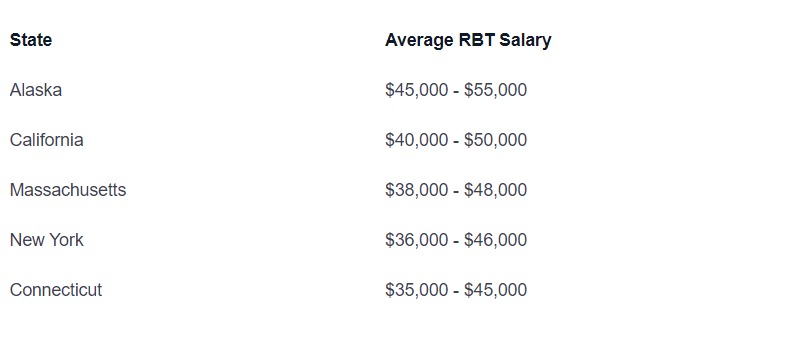
Please note that the figures provided are approximate and can vary based on factors mentioned earlier.
Understanding the salary ranges in different states can help RBTs make informed decisions about potential job opportunities and relocation possibilities. It’s important for RBTs to consider their personal circumstances and factors beyond salary when evaluating employment options.
Factors Influencing RBT Salary Discrepancies
Several factors contribute to the salary discrepancies among Registered Behavior Technicians (RBTs) across different states. Understanding these factors is crucial for gaining insights into the variations in RBT salaries.
Cost of Living
The cost of living in a particular state plays a significant role in determining RBT salaries. States with higher costs of living, such as California and New York, often offer higher salaries to compensate for the increased expenses. On the other hand, states with lower costs of living, like Mississippi and Arkansas, tend to have lower RBT salaries.
To provide a clearer comparison, let’s take a look at the average annual RBT salaries in different states:

Demand and Job Market
The demand for RBTs and the overall job market conditions can also impact salary discrepancies. States with a higher demand for RBTs, such as California and Florida, may offer higher salaries to attract and retain qualified professionals. Conversely, states with a lower demand may have lower salaries due to a smaller market and less competition for RBT positions.
Let’s take a look at the average annual RBT salaries in states with varying demand and job market conditions:
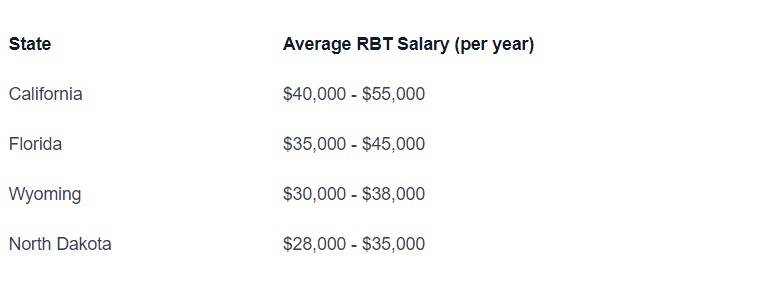
State Regulations and Requirements
State regulations and requirements can also influence RBT salary discrepancies. Some states have stricter regulations and higher training requirements for RBTs, which may result in higher salaries to reflect the additional qualifications. Conversely, states with less stringent regulations and requirements may have lower salaries.
Here are examples of average annual RBT salaries in states with varying regulations and requirements:
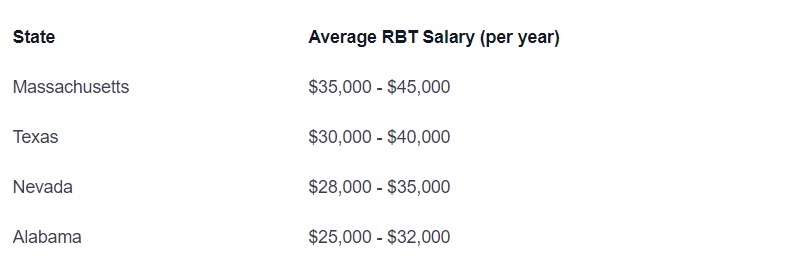
It’s important to keep in mind that these salary ranges are approximate and can vary based on factors such as experience, education, and specific job roles within the field of applied behavior analysis (ABA). By considering the cost of living, demand and job market conditions, as well as state regulations and requirements, individuals can gain a better understanding of the salary discrepancies among RBTs in different states.
Exploring RBT Salary Ranges
When it comes to the salary of Registered Behavior Technicians (RBTs), it’s important to understand the different salary ranges based on experience and skill level. Here, we will explore the salary ranges for entry-level RBTs, mid-level RBTs, and experienced RBTs.
Entry-Level RBT Salaries
Entry-level RBTs typically have limited experience in the field and may have recently completed their RBT certification. As such, their salaries tend to be on the lower end of the scale. However, these salaries can vary depending on factors such as location and demand for RBT services.
The table below provides an overview of the entry-level RBT salaries in different states:
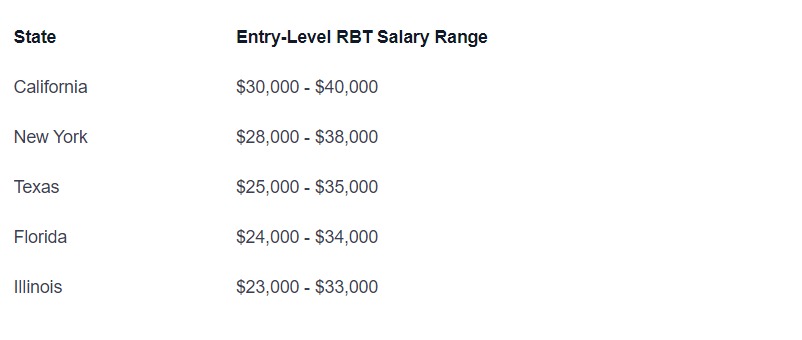
Mid-Level RBT Salaries
Mid-level RBTs have gained some experience in the field and have likely been practicing as RBTs for a few years. With increased experience and expertise, their salaries tend to be higher than those of entry-level RBTs.
The table below provides an overview of the mid-level RBT salaries in different states:
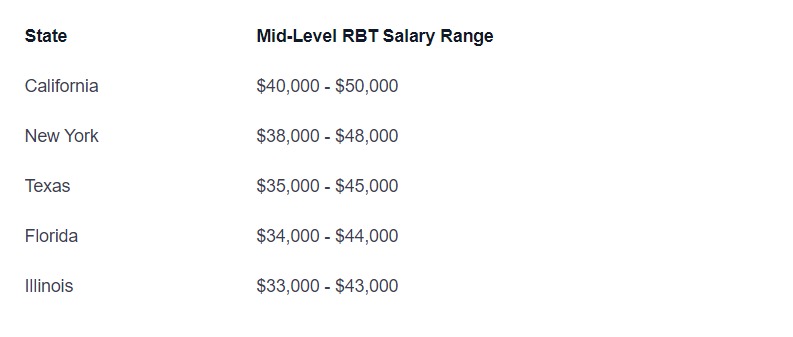
Experienced RBT Salaries
Experienced RBTs have a wealth of knowledge and expertise in the field, often accumulated through several years of practice. With their advanced skills and experience, their salaries are generally higher compared to entry-level and mid-level RBTs.
The table below provides an overview of the experienced RBT salaries in different states:
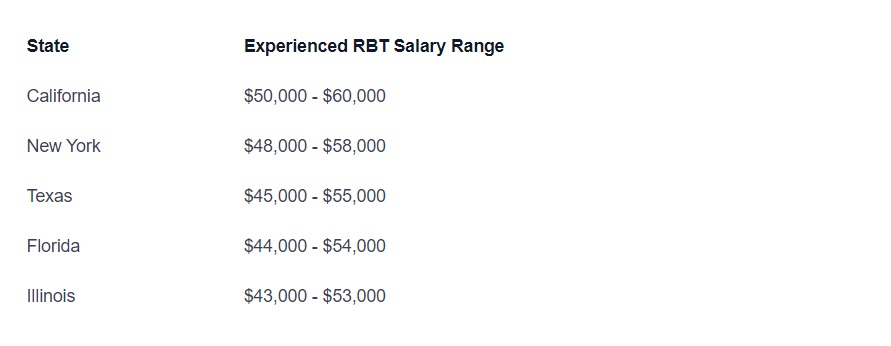
It’s important to note that these salary ranges are approximate and can vary based on factors such as demand for RBT services, cost of living, and individual qualifications. Additionally, other factors such as advanced certifications and additional responsibilities can also influence salary levels within each experience category.
By understanding the salary ranges for different experience levels, RBTs can have a better understanding of the potential earning potential in their respective states. It’s important to consider these ranges as a starting point and to take into account individual qualifications and other relevant factors when negotiating salaries or seeking career advancement opportunities.
Tips for Maximizing RBT Salary
When it comes to maximizing your salary as a Registered Behavior Technician (RBT), there are several strategies you can employ. By focusing on continuing education and certification, seeking career advancement opportunities, and negotiating salary and benefits, you can work towards increasing your earning potential as an RBT.
Continuing Education and Certification
Continuing education and obtaining additional certifications can significantly impact your RBT salary. By investing in your professional development, you demonstrate your commitment to excellence and enhance your skills as an RBT. This can open doors to higher-paying positions and increase your marketability in the field.
Consider pursuing advanced certifications such as the Board Certified Assistant Behavior Analyst (BCaBA) or Board Certified Behavior Analyst (BCBA) credentials. These certifications can expand the scope of your practice and potentially lead to higher-paying job opportunities. Additionally, staying up to date with the latest research and best practices in the field of Applied Behavior Analysis (ABA) through workshops, conferences, and online courses can further enhance your expertise and value as an RBT.
Seeking Career Advancement Opportunities
Advancing your career within the field of ABA can also contribute to an increase in your RBT salary. Look for opportunities to take on additional responsibilities or leadership roles within your organization. This could involve becoming a senior RBT, a team leader, or a supervisor. By demonstrating your leadership abilities and taking on more complex cases, you can position yourself for promotions and salary advancements.
Consider exploring opportunities within different settings, such as clinics, schools, or private practices. Some settings may offer higher salaries or additional benefits that can contribute to your overall compensation package. Networking with professionals in the field and actively seeking out job openings can help you identify potential career advancement opportunities.
Negotiating Salary and Benefits
When starting a new job or during annual performance reviews, it’s important to negotiate your salary and benefits. Conduct research to understand the average RBT salary in your area and use this information as a benchmark during negotiations.
Highlight your experience, skills, and any additional certifications or advanced training you possess to demonstrate your value to the organization.
In addition to salary, consider negotiating other benefits that can contribute to your overall compensation package. These may include health insurance, retirement plans, paid time off, or professional development allowances. Remember to approach negotiations professionally and be prepared to make a strong case for why you deserve a higher salary or improved benefits.
By focusing on continuing education and certification, seeking career advancement opportunities, and negotiating your salary and benefits, you can maximize your earning potential as an RBT. Remember to track your accomplishments, regularly update your resume, and stay proactive in your professional development to continuously enhance your value in the field of ABA.
Analysis of Benefits offered to RBTs in Different States and Settings
When considering potential job opportunities, it’s important for RBTs to not only consider salary, but also the benefits offered by different employers. Benefits can vary widely by state and setting, so it’s essential to conduct thorough research when evaluating employment options.
In terms of healthcare benefits, some states may require employers to offer health insurance coverage while others may not have such regulations in place. Additionally, the type and extent of coverage can vary significantly between employers. It’s important for RBTs to carefully review and compare healthcare plans to ensure they are getting the coverage they need.
Other common benefits offered to RBTs include retirement plans, paid time off, and professional development allowances. Retirement plans can provide long-term financial security while paid time off allows for work-life balance and time to recharge. Professional development allowances can help RBTs stay up-to-date with the latest research and best practices in ABA.
In terms of settings, the benefits offered by clinics or private practices may differ from those offered by schools or government agencies. For example, some private practices may offer more flexibility in terms of scheduling or remote work options while schools may offer additional opportunities for professional growth and advancement.
Overall, understanding the benefits offered by different employers is crucial for making informed decisions about potential job opportunities. By carefully reviewing and comparing these benefits alongside salary considerations, RBTs can identify positions that offer comprehensive compensation packages that meet their personal needs and goals.
Conclusion
In conclusion, understanding the factors that contribute to salary discrepancies among Registered Behavior Technicians (RBTs) is crucial for individuals considering a career in this field. By analyzing state regulations and requirements, demand and job market conditions, as well as varying levels of experience and expertise, RBTs can gain a better understanding of the potential earning potential in their respective states.
Additionally, by focusing on continuing education and certification, seeking career advancement opportunities, and negotiating salary and benefits, RBTs can work towards maximizing their earning potential and achieving long-term professional success. Ultimately, by staying informed about industry trends and proactively investing in their professional development, RBTs can build rewarding careers that make a positive impact on the lives of individuals with autism spectrum disorders and other developmental disabilities.
Sources
- https://www.appliedbehavioranalysisprograms.com/careers/registered-behavior-technician/
- https://www.bls.gov/oes/current/oes319099.html
- https://www.payscale.com/research/US/Job=Registered_Behavior_Technician/Hourly_Rate
- https://www.simplyhired.com/salaries-k-registered-behavior-technician-jobs.html




